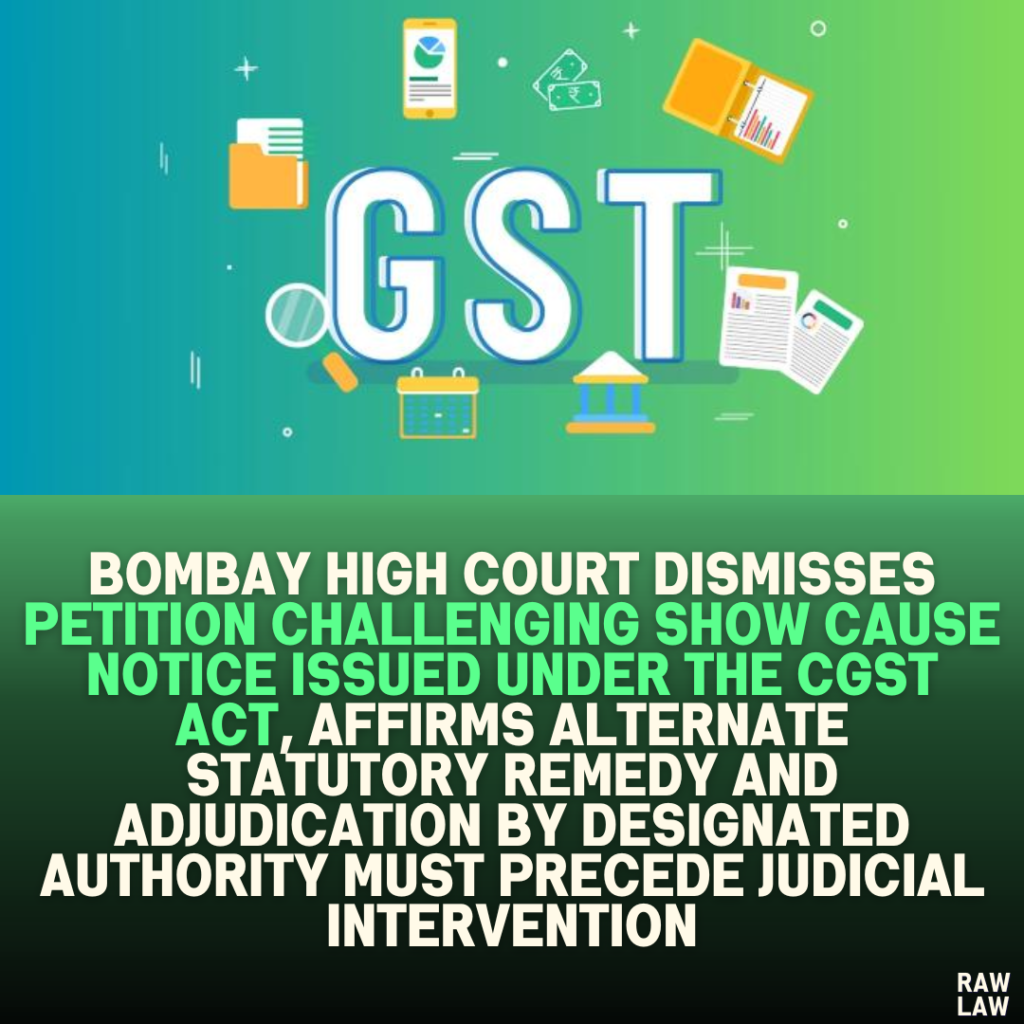Court’s Decision
The Bombay High Court dismissed a writ petition filed by Apollo Tyres Limited challenging a show cause notice issued under the CGST Act, SGST Act, and IGST Act. The Court held that the petitioner had an alternate statutory remedy and that adjudication by the designated authority must precede judicial intervention. However, the Court allowed the petitioner time to respond to the show cause notice and directed the respondent to provide a personal hearing before passing a reasoned order.
Facts of the Case
- Show Cause Notice: On August 2, 2024, a show cause notice was issued to Apollo Tyres Limited by the Directorate General of GST Intelligence. The notice sought to centralize and adjudicate issues related to CGST, SGST, and IGST, alleging suppression of facts, misstatements, and evasion of GST from July 2017 to March 2022. It invoked an extended limitation period based on these allegations.
- Petitioner’s Contention: The petitioner argued that the notice was barred by limitation and was issued to give retrospective effect to Circular No. 212/6/2024 dated June 26, 2024. The petitioner also claimed that the show cause notice lacked jurisdiction and violated procedural norms.
- Respondent’s Arguments: The customs authorities contended that the show cause notice was based on evidence gathered during investigations, including statements and documents, and argued that the petitioner should respond through the adjudication process.
Issues
- Whether the show cause notice was issued without jurisdiction and barred by limitation.
- Whether the petitioner could bypass the adjudication process and seek relief directly through a writ petition under Article 226 of the Constitution.
Arguments Presented
- Petitioner (Apollo Tyres Limited):
- Asserted that the notice was issued beyond the one-year limitation period and aimed to retrospectively apply Circular No. 212/6/2024.
- Argued that the High Court should intervene to quash the notice, citing violation of procedural norms and lack of jurisdiction.
- Respondents (Tax Authorities):
- Maintained that the petitioner had alternate remedies under the CGST Act and should first respond to the show cause notice.
- Emphasized that allegations of suppression of facts and misstatements required factual adjudication, which could not be bypassed through writ jurisdiction.
Court’s Observations
- Jurisdiction and Alternate Remedy: The Court reiterated that writ petitions against show cause notices are generally not maintainable unless fundamental rights are violated, natural justice is breached, or the proceedings are wholly without jurisdiction. None of these conditions were met in the present case.
- Adjudicatory Process: The Court held that the petitioner must respond to the notice and present its defenses during the adjudication process. It emphasized that the adjudicating authority was competent to address jurisdictional and factual issues raised by the petitioner.
- No Evidence of Retrospective Application: The Court found no reference to Circular No. 212/6/2024 in the show cause notice and held that the petitioner’s claim of retrospective application was unfounded.
Conclusion
The Bombay High Court dismissed the writ petition, granting the petitioner time until December 15, 2024, to respond to the show cause notice. The respondent was directed to provide a personal hearing and pass a reasoned order by January 31, 2025. The Court clarified that it had not expressed any opinion on the merits of the case, keeping all issues open for adjudication.
Implications
This judgment underscores the principle that writ jurisdiction should not be invoked to circumvent statutory remedies, particularly in tax matters. It affirms the importance of adjudication processes and reinforces the statutory framework under the GST regime.
